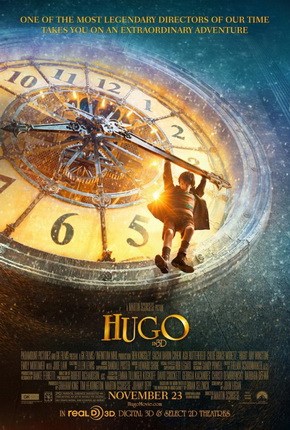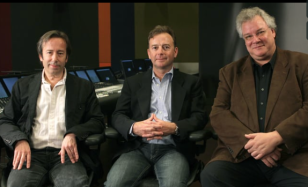 After a film goes through all of the steps of pre-production and production, it’s time to edit, and once that starts happening, it’s also time to think about post-production sound. Sound plays a major role in filmmaking, not just during the production process, but afterwards, when sound designers and editors get down into the knitty-gritty, the sound effects, the dialogue, and every single element that makes the atmosphere and the story of the film completely come to life. The intricacies of sound design played a major role in the making of Hugo, a 2011 Scorsese film set in 1930’s Paris, about a boy who lives in a train station and becomes intrigued by a mysterious “automaton” and its relation to his recently deceased father. Everything from dialogue and everything recorded in production, to sound effects for the gears of the clocks, the noise of the train station, the trains, the people, etc. took a great deal of time to master in order to result in a pristine and believable product that was as magical as just the look of the film itself.
After a film goes through all of the steps of pre-production and production, it’s time to edit, and once that starts happening, it’s also time to think about post-production sound. Sound plays a major role in filmmaking, not just during the production process, but afterwards, when sound designers and editors get down into the knitty-gritty, the sound effects, the dialogue, and every single element that makes the atmosphere and the story of the film completely come to life. The intricacies of sound design played a major role in the making of Hugo, a 2011 Scorsese film set in 1930’s Paris, about a boy who lives in a train station and becomes intrigued by a mysterious “automaton” and its relation to his recently deceased father. Everything from dialogue and everything recorded in production, to sound effects for the gears of the clocks, the noise of the train station, the trains, the people, etc. took a great deal of time to master in order to result in a pristine and believable product that was as magical as just the look of the film itself.
Co-supervising sound editors Philip Stockton and Eugene Gearty along with sound rerecording mixer Tom Fleischman talk about the so und design for Hugo in a video interview conducted by Michael Coleman, and they make notable points concerning the importance of having good sound in a film. In the interview, Fleischman explains, “at any given moment, there’s something that’s important to hear, whether it’s a little bit of dialogue or something in the music or a sound effect…” At one point, Gearty expresses, “The opportunity to work on a film where the sound effects and sound design was integral to the story and to the script – that’s always a real treat.” So, we see the importance of sound, especially in Hugo. Getting more into detail, the three sound-designers talk about this process and what they had to go through to get a solid balance between dialogue, music, and sound effects throughout the film, especially within the dream scene where the train derails at the station, runs through the walkway, and bursts through a big glass window, (which can be seen in the video interview). Gearty also talks about coming up with sounds for the clocks by recording other clocks that ran mechanically as well as using little ticks and gears that he recorded to loop in order to get the unique sounds for the beginning sequence. And when it came to the automaton, they said that it took them about 2 months to come up with the right sounds to accompany its movements, which involved a lot of trial and error, and give and take with Scorsese and the editors.
und design for Hugo in a video interview conducted by Michael Coleman, and they make notable points concerning the importance of having good sound in a film. In the interview, Fleischman explains, “at any given moment, there’s something that’s important to hear, whether it’s a little bit of dialogue or something in the music or a sound effect…” At one point, Gearty expresses, “The opportunity to work on a film where the sound effects and sound design was integral to the story and to the script – that’s always a real treat.” So, we see the importance of sound, especially in Hugo. Getting more into detail, the three sound-designers talk about this process and what they had to go through to get a solid balance between dialogue, music, and sound effects throughout the film, especially within the dream scene where the train derails at the station, runs through the walkway, and bursts through a big glass window, (which can be seen in the video interview). Gearty also talks about coming up with sounds for the clocks by recording other clocks that ran mechanically as well as using little ticks and gears that he recorded to loop in order to get the unique sounds for the beginning sequence. And when it came to the automaton, they said that it took them about 2 months to come up with the right sounds to accompany its movements, which involved a lot of trial and error, and give and take with Scorsese and the editors.
Not only are sound effects important, but so is dialogue, as well as the process of finding a way to clean it up when something goes wrong during production. Sometimes, during the production, they would try to use boom mics, and they would also use radio mics on the actors, which caused them to run into problems like clothing-crackles and inevitable noise that came from steam, or from the large number of extras they had walking around the train station on set. However, there are tons of ways to conceal these problems in post-production, and this is why sound design is so crucial. Fleischman explains, “This is all about telling a story. I see a lot of films where you can’t hear the dialogue, everything is sort of a mush…[so much] that you can’t discern much.”
It’s safe to say that the sound design in Hugo is not mushy at all. Every little scene is so involved, the set, the characters, the animals, the automaton, every single prop is crucial to the story, and sound is imperative to truly making all of these factors appear realistic. Sound is something that a lot of people tend to overlook when it comes to film, but it is just as important for the sound to be as seamless as the editing, and as immaculate as the cinematography and all other elements of creating a film – which is something that I think is really exemplified in Hugo, which won best achievement in sound mixing and sound editing at the 2012 Oscars.
Take a listen for yourself: click here.